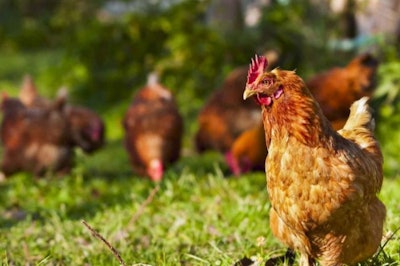
With the world focusing on COVID-19 and efforts to develop vaccines and treatments, it is all too easy to overlook the other diseases that threaten the poultry industry and the work being done to prevent or control them.
Avian influenza is key among those threats and, while it may have been sidelined in reporting, this does not mean that efforts are not continuing to find solutions.
In contrast to the novel of deaths attributable to the novel coronavirus, the death rate associated with avian influenza remains thankfully low. There have been 134 human fatalities since 2009, however, this is certainly not the case for poultry. Approximately 1.2 million birds were lost through 150 new outbreaks in domestic flocks between March 27 and April 16, data from the World Organisation for Animal Health (OIE) reveals, and there is a human and economic cost to this.
Researchers now, however, believe that they have found a quick way of reducing the symptoms of avian influenza in poultry and reducing the amount of virus that infected birds shed into the environment. Their work may also have broader implications for both poultry and human health.
Synthetic antibodies
Scientists at the U.K.’s Pirbright Institute have engineered synthetic antibody molecules with the potential to act an immunotherapy.
The institute’s avian influenza group worked with the H9N2 virus strain, which can readily mutate and poses a threat not only to avian species but also to mammals, and produced synthetic antibodies.
Modified antibody segments, known as single chain variable fragment antibodies (scFvs), were shown to prevent H9N2 from entering cells in tissue cultures and further testing demonstrated that chickens immunized intranasally produced lower levels of virus and presented decreased weight loss compared to untreated birds.
The scFv antibodies work by binding to proteins on the outside of the influenza virus, called haemagglutinin (HA), that attach to receptors on host cells. This prevents the virus from entering the cell and replicating, and offers rapid protection to infected birds.
To create the scFvs, the team immunized mice with an influenza vaccine, which triggered the production of mouse antibodies capable of neutralizing the H9N2 virus.
The genetic code for two sections of the antibodies that bind to the HA protein was then sequenced. Using genetic engineering, they linked these two sections together to create one new smaller antibody molecule (the scFvs).
Using these smaller molecules, the team could overcome issues presented by using whole antibodies, such as lower production rates and an increased likelihood of immune rejection by species other than chickens. The scFvs created in the study have additional advantages, including their ability to be mass produced in insect cells and the fact they could work in all hosts without adaption.
Results so far have been encouraging. scFvs could provide a quick and efficient way or reducing the clinical signs of influenza and its spread in infected flocks, reducing the risk of transmission from poultry to humans.
The next step is to establish what would be the best method of administration, be it intranasally, as was the case in the study, or via aerosol or viral vector delivery systems.
Immunotherapy treatments, such as synthetically made antibodies, have become popular as they can be rapidly produced in large quantities in cultured cells, function in a similar way to natural antibody immune responses and also provide immediate protection compared to vaccines.
The researchers believe that this type of immunotherapy could be used to treat other viral diseases of poultry and humans, by creating appropriate synthetic antibodies for those diseases.

















